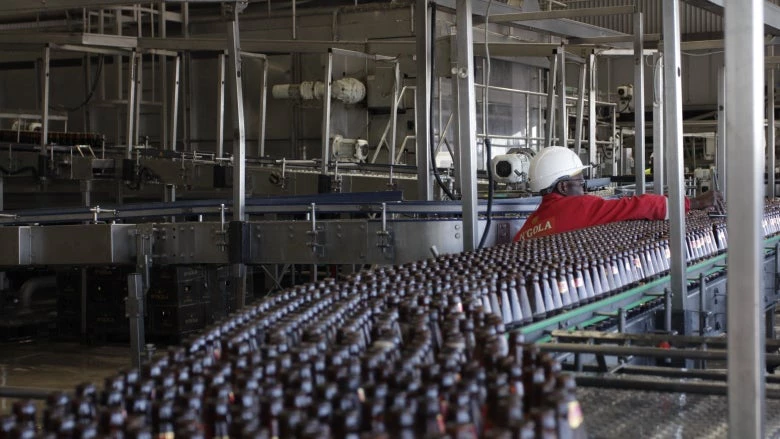Bottling plant in Angola. Photo by Flore de Preneuf/ World Bank.
Six years after it was introduced, the Compact with Africa initiative (CwA) is having to adapt to a new geopolitical context. In this new context, supply chains are being restructured and African governments are rethinking their priorities and relationships, given the fact that they offer key solutions to current supply chain pressures in advanced economies. At the recent CwA conference in Berlin, while significant commitments in the energy sector were made, a key job-creating theme was omitted: industrialization.
When it was launched in 2017 under Germany’s G20 Presidency, the goal of the G20 Compact with Africa was to promote private investment in participating African countries by encouraging reforms in the macro, business and financing frameworks. Six years later, in November 2023, Berlin hosted 14 African and European heads of state, as well as the Chairperson of the African Union, and the Presidents of the European Commission and the European Council. This high-level conference highlighted the commitments to reforms in African countries, as well as the push to increase public and private investments from G20 countries and beyond to participating African countries. The event demonstrated renewed interest in an initiative that is growing in number: the Democratic Republic of Congo (DRC) has formally joined the CwA; Kenya, Zambia, and Angola have expressed interest.
For the host of the event, Germany, the issue, when it comes to investments, is how little of German FDI goes towards Africa. Despite being the third largest economy in the world (having recently overtaken Japan), Germany is only the 17th largest investor in Africa, as measured by FDI stock in 2019 according to the World Bank’s Harmonized Bilateral FDI database.
Almost 60% of German FDI in Africa is in manufacturing, while the share of commodities is marginal. African economies can benefit from more manufacturing investments. Not only do they bring the fresh capital, skills and technology so badly needed to raise living standards. Manufacturing FDIs can contribute to a shift of labor from low-productivity sectors such as subsistence agriculture or informal services, to higher-productivity sectors. Those investments can increase domestic firm-productivity through spillover effects such as the dissipation of industrial processes, technical know-how, or management techniques.
The recent Africa’s Pulse report published by the World Bank shows that the overabundance of micro firms has contributed to slow per-capita growth and, hence, slow poverty reduction in Africa. A stunning 96% of African firms have fewer than five employees. The lack of firm growth inhibits entrepreneurs from adopting new technologies, accessing larger markets, and hiring more workers. This ultimately holds back the creation of good-quality jobs.
Attracting investments in transformative sectors that create and reinforce local value chains is urgent, both to increase firm productivity and create direct and indirect quality jobs. But attracting these kinds of manufacturing investments in sectors in which African countries have a comparative advantage may require an increased focus on targeted industrial policy, specific to each country and sector - whether in the manufacturing of food products, processing raw materials in the battery value chains, or building automotive parts.
How can the CwA help in this regard? By becoming a platform that supports African governments in developing credible industrial policies that can allow them to transform their economies and build things for local consumption and export. In the current geopolitical climate, the CwA could be a platform that works both for African countries seeking to industrialize, and advanced economies seeking to diversify their supply chains, while also setting up shop in the growth markets of the future.
African economies can’t afford not to industrialize. Their import dependence has contributed to the balance of payments and financing issues many African countries are currently facing. At the same time, given current geopolitical shifts, advanced economies are diversifying not only their supply chains but also the number of markets where their firms sell their products. As firms are increasingly producing where they sell, G20 countries should offer them the financing and risk mitigation instruments needed to incentivize local production in Africa for the rapidly growing and regionally integrating African market.
As a student from Ghana’s Ashesi University told Germany‘s Chancellor on his recent visit to Accra: "Ideas exist on the continent and need to be developed and given the stage and opportunity to flourish." Those ideas are not only to create firms with less than five employees, but firms with the size that allow them to power Africa’s future and place in the emerging geopolitical world.




Join the Conversation